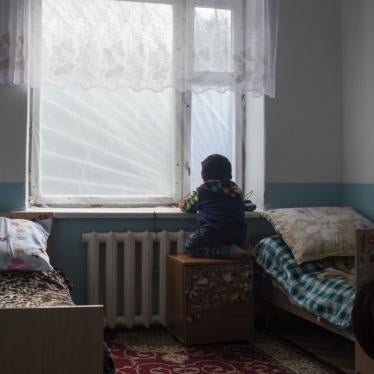We drove up a narrow, winding road, with trees on both sides for what seemed like an eternity. Finally, at the top of the hill, there it was: a three-building complex with a sign on the gate that read “Psihijatrijska bolnica Lopača” (Psychiatric Hospital “Lopača”).
From the top, I took in the green forests and hills. This beauty was in stark contrast to what I was about to see. Dr Radmir Rakun, director of the hospital, unlocked the metal gates to the wards where 168 people, including 20 children, were confined. Some have been there for decades. “The elderly usually stay until the end,” Dr Rakun told me.
As we entered Lopača, the stench of urine and bleach hit me. I saw people, most appearing sedated, lying on couches and beds. The once-white paint was peeling from the walls, some beds were equipped with physical restraints, windows had iron bars, and cameras mounted on the ceiling watched every move.
My first impression was that this is not a place where people could be healed.
At Lopača, I met Ivan (not his real name), a young man with a mild mental health condition. When Ivan was just a baby, a family court ordered his removal from his parents because of mistreatment and neglect. He lived with his aunt, but, when he was four, war broke out in Croatia and his aunt could no longer care for him full time. He was turned over to the local Center for Social Welfare, a government agency that placed him in an orphanage. For the next five years, Ivan lived between his aunt and various orphanages. When he was just nine, he was taken to a psychiatric hospital for children, Kukuljevička, in Zagreb. He spent two months there and then again was shuffled between his aunt’s home and different orphanages.
The center eventually placed him in a foster family, where he was forced to work on a farm and was physically and verbally mistreated by his foster father, whom he called the “boss.”
“I saw a dead old man for the first time in my life in that house,” he told me. “The boss made me shave this dead man. I couldn’t refuse. I would have gotten a beating.” He was 14 at that time. During his year with the foster family, he said, social welfare officials never paid a visit.
After being mistreated in another foster family, Ivan was moved from one institution to another until, at 16, he was placed in Lopača.
Today, Ivan is my age, 30. While I talked with him in the garden at Lopača, I couldn’t help but think of all the things he has missed - things I took for granted: living with my family, going to school, playing sports, traveling, getting my first job … Ivan only attended primary school, has never traveled anywhere and has no job or family ties. Another thought struck me, too: he is stuck in there.
In 2008, Croatia ratified the UN Convention on the Rights of People with Disabilities, an international treaty that prohibits the detention of people simply on the grounds of their disability and upholds the right of people with disabilities to live independently in the community.
Three years later, under pressure to join the European Union, the Croatian government adopted a deinstitutionalization plan, which aims to move people with intellectual and psychosocial disabilities out of institutions and into the community, where they can live on their own. However, this plan does not include people like Ivan who have been placed long-term, without their consent, in psychiatric hospitals.
Ivan told me he did not consent to being placed at Lopača. In fact, he has never been asked about his preferences. When he was a child, the Center for Social Welfare made decisions for him under the Croatian guardianship regime for children. When he reached 20, the center initiated court proceedings to remove Ivan’s legal capacity – his right to make decisions about his life – and appointed a social worker as his legal guardian. Ivan did not attend a hearing to provide his input into this major decision about his life, and, even when the court reached its decision, no one offered him any explanation about why his legal capacity had been removed and what this meant for him.
As a result, Ivan lost his right to make decisions about where and how he wants to live, and cannot sign an employment contract, or make health care decisions. He is one of roughly 18,000 people in Croatia similarly living without legal capacity.
Ivan did not commit a crime but is trapped in what amounts to a prison. The big difference however is that people cannot be placed in Croatian prisons indefinitely without any chance to appeal. People with psychosocial disabilities who are placed for “long-term” care in psychiatric hospitals can be.
Ivan still thinks that it is his fault that he ended up in a psychiatric hospital when he was just a child and that it is his fault that he is not part of the Croatian de-institutionalization plan. In truth, the responsibility lies with the government.
Today, more than 1,900 people with psychosocial disabilities across Croatia suffer a similar fate, ineligible for deinstitutionalization. They live, without having given their consent, in psychiatric hospitals, or in privately run but state-funded institutions, in so-called family homes for up to 20 people, or with foster families but with limited interaction with the community. Even for the 2,833 adults with psychosocial disabilities who were eligible for deinstitutionalization, as of September, only 96 had moved into the community.
The institutionalization of people with disabilities and denial of their right to legal capacity is not a Croatian model per se. It can be found in varying degrees in most countries.
Guardianship regimes and institutionalization, no doubt, might have had the aim of protecting and caring for people who were vulnerable to abuse and who needed help because of a health condition or because they had been abandoned. However, good intentions do not always make for good policy. In reality, guardianship regimes stripped people with disabilities of the most fundamental rights to make choices about their lives and live independently. Institutions went even further by segregating people with disabilities from their own community - sometimes for their entire lives.
Ivan’s words still echo with me: “The easiest thing is to take everything from a person but not to ask if that person can change.”
As the EU’s newest member, Croatia should make sure that everyone with a disability has the possibility of moving into the community. The government should invest in community-based services to empower and support people with disabilities. Without these efforts, people like Ivan will remain locked in institutions “until the end.”
Emina Ćerimović is a Koenig fellow at Human Rights Watch and led follow-up research on Croatia’s de-institutionalization plan.







